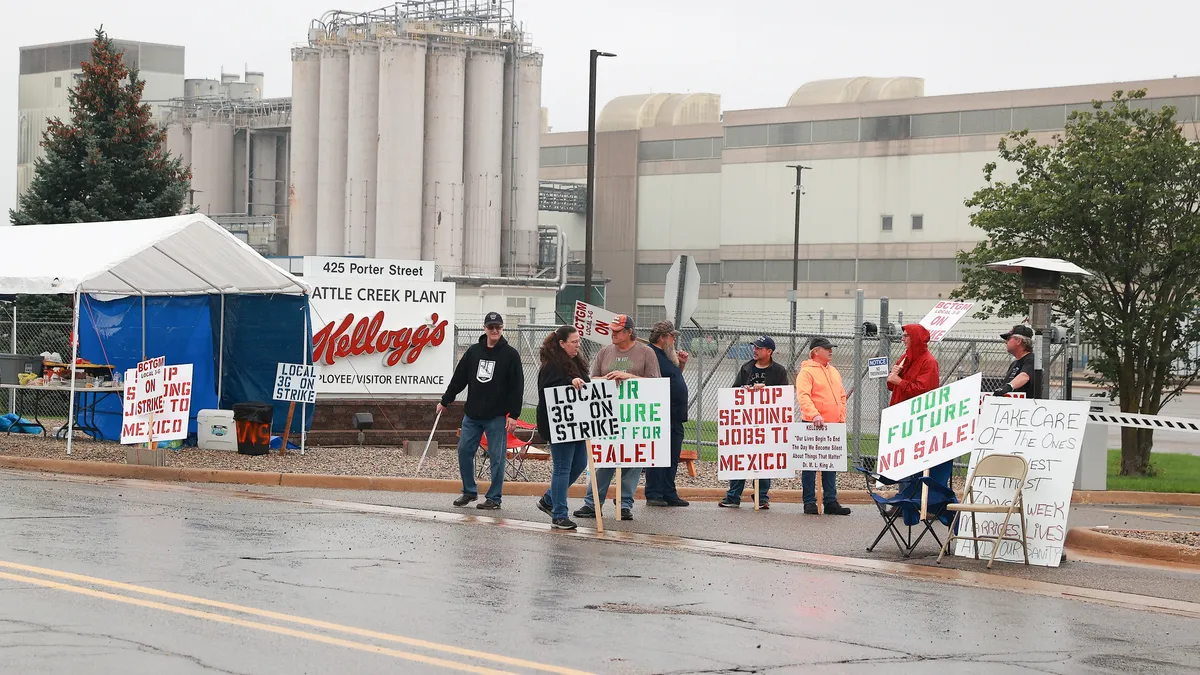Dive Brief:
- Kellogg predicts there are more difficulties ahead in Q4 due to a strike that has compounded existing supply chain issues, according to an earnings call last week.
- "Contrary to our prior assumptions, we are seeing no moderation of the economy-wide bottlenecks and shortages deal in the fourth quarter," CFO Amit Banati said on the Q3 earnings call. "In fact, we're now experiencing incremental disruption and costs further compounded by a labor strike."
- Kellogg CEO Steve Cahillane told Bloomberg last week that the company is importing cereal from outside the U.S. — saying it will "leverage the totality of its global network" across Canada, Mexico, the U.K. and Australia — in order to maintain supply as a strike of 1,400 workers at its ready-to-eat cereal plants in four states enters its sixth week.
Dive Insight:
On top of labor issues, market-driven prices of ingredients like dairy and rice, as well as higher packaging costs, have led to significantly increased levels of inflation for the company, Banati said during the call. Amid this, he said, the company has executed contingency plans to mitigate the impact on its operations.
"From a revenue growth management standpoint, we're obviously taking action and broadly, I'd say covering our commodity-related costs and our direct costs," Banati said. "I think some of the disruptions are hard to predict."
The effort to maintain a flow of cereal to shelves comes as the Bakery, Confectionery, Tobacco Workers and Grain Millers International Union recommended workers reject Kellogg's latest contract proposal.
In a statement, union said that the offer does not provide what workers want from Kellogg, which would be a “predictable pathway to fully vested, fully benefited employment for all employees with no concessions.” It accused Kellogg of not being willing to negotiate with the union’s terms and conditions.
Meanwhile, Kellogg said in a statement that it has a responsibility to its business and consumers to keep its facilities open “with other resources." It has brought in salaried workers from the strike security firm AFIMAC to continue operations at the plants.
"The offer that we have in front of the union right now is increased compensation on top of that already industry-leading compensation and benefits, and we're not asking to take anything away, despite what you may have heard publicly," Cahillane said.
The union noted strikes this year at other unionized workplaces and record numbers of non-union workers quitting their jobs — "the closest such workers can come to striking."
"The grievances of the strikers and the quitters (and there’s nothing pejorative in this usage of 'quitter') are much the same: lack of control over their time and their lives, a similar lack of assurance of any future economic security, and a steadily mounting transference of risk from their employers to themselves," the union wrote in a blog post.
Colin Campbell, a reporter at Supply Chain Dive, contributed to this article.
















